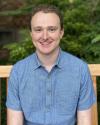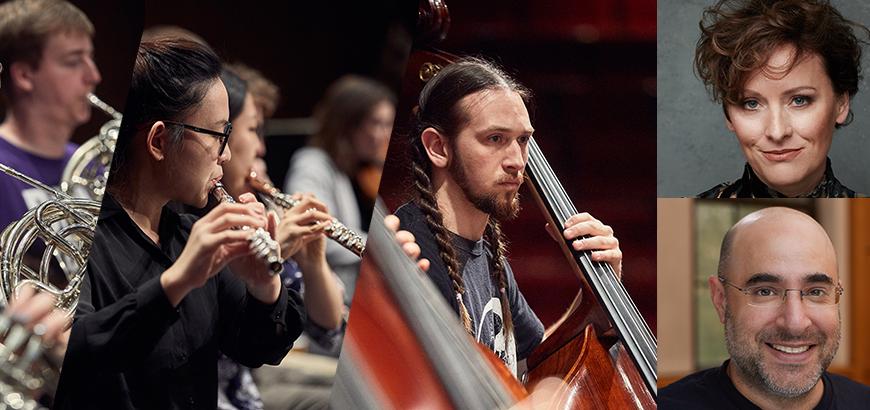David Alexander Rahbee leads the University Symphony in a program of music by Debussy, Dukas, Ligeti, Reynaldo Hahn, and Haydn. With faculty artist Carrie Shaw, coloratura soprano on Ligeti’s Mysteries of the Macabre, from Le Grand Macabre.
Program
Claude Debussy (1862-1918): Prélude à “L’après-midi d’un faune”
Ryan Farris, conductor
Paul Dukas (1865-1935): La Plainte, au loin, du faune
Orchestrated by David A. Rahbee
György Ligeti (1923-2006): Mysteries of the Macabre from Le Grand Macabre (arr. Elgar Howarth)
Coloratura soprano: Carrie Shaw
-Intermission-
Dukas: La Péri: Fanfare
Brass of the UW Symphony, Ryan Farris, conductor
Debussy: Hommage à Haydn
Orchestrated by David A. Rahbee
Reynaldo Hahn (1874-1947): Theme & Variations sur le nom Haydn
Orchestrated by David A. Rahbee
Joesph Haydn (1732-1809): Symphony No. 87 in A Major
I. Vivace
II. Adagio
III. Menuet
IV. Vivace
PROGRAM NOTES
CLAUDE DEBUSSY (1862-1918)
Prélude à l'après-midi d'un faune (1894)
It would not be an exaggeration to say that Prélude à l'après-midi d'un faune, known in English as Prelude to The Afternoon of a Faun, was the piece that put the young French composer Claude Debussy on the musical map. Debussy had been struggling to achieve success as a composer, so he turned to the works of symbolist poet Stéphane Mallarmé for inspiration. Originally published in 1876, Mallarmé’s poem L'après-midi d'un faune explores the sensual experiences of a faun who has just woken up from his afternoon sleep. It was quickly hailed as one of the greatest poems in the French language, and inspired many artists and musicians of the age, Debussy chief among them. Originally conceived of as a work in three movements, Debussy eventually abandoned this plan when his ideas for the 'prelude' proved to be so musically fruitful.
Instead of being a literal tone painting, Debussy attempts to evoke the sensuality and eroticism of Mallarmé’s poem with his slow, beautiful melodies and richly layered orchestration. The work opens with a now famous passage for solo flute which spans the musical interval of a tritone. This has the immediate effect of obscuring any concrete sense of tonality, and while the work cannot be called atonal, Debussy masterfully avoids traditional musical cadences throughout the piece, using novel harmonic devices such as the whole-tone scale to create a sumptuous and exotic sonic landscape from beginning to end.
PAUL DUKAS (1865-1935)
La plainte, au loin, du faune… (1920), orchestrated by David Alexander Rahbee
This short work for solo piano was composed by Paul Dukas for a collection of pieces published in memory of Claude Debussy, who had passed away 2 years before. Roughly translated as ‘the complaint, from afar, of the faun’, the work weaves together several musical ideas from Debussy’s Prélude à l'après-midi d'un faune into a strange sonic tapestry. The work is unmistakably melancholy, reflecting Dukas’ sorrow at the passing of one of his closest friends.
GYÖRGY LIGETI (1923-2003)
Mysteries of the Macabre (1977; revised 1992), arranged by Elgar Howarth
Hungarian-Austrian composer György Ligeti has often been hailed as one of the most important figures in the musical avant-garde during the latter half of the 20th century. Ligeti rose to international fame in 1968 when his music was used (without his consent) by director Stanley Kubrick in his epic science-fiction film 2001: A Space Odyssey. By 1977 Ligeti had finally, after 13 years of composition, completed work on his only opera, Le Grand Macabre, loosely based on Michel de Ghelderode’s 1934 play La balade du grand macabre. The opera is a work of Absurdist theater; Ligeti himself called it an ”anti-anti-opera”. The plot essentially revolves around the character of Death (known as Nekrotzar, the Prince of Hell) who arrives in the fictional city of Breughelland and announces that a comet will strike the Earth at midnight, ending the world. When Ligeti revised the opera in 1992 he selected three arias to be used together as a concert piece, known as Mysteries of the Macabre. This piece, which will be presented tonight in a reduced orchestration by Elgar Howarth, is a tour-de-force for coloratura soprano and orchestra, calling upon all manner of extended techniques, bizarre rhythms, baffling timbres, and other adventurous musical effects.
PAUL DUKAS (1865-1935)
Fanfare pour précéder “La Péri” (1912)
Dukas composed his monumental ballet La Péri in 1911, but its premiere was delayed by almost a year over a dispute with the dance company. This gave Dukas time to compose this fanfare which was to be performed directly before the ballet. This Fanfare to proceed “La Péri” has become arguably one of Dukas’ most famous works and is regularly performed on its own due to its exciting character and excellent writing for brass instruments.
CLAUDE DEBUSSY (1862-1918)
Hommage à Haydn (1909), orchestrated by David Alexander Rahbee
This short work for solo piano was written for a collection of pieces commemorating the 100th anniversary of Joseph Haydn’s death. Debussy spells Haydn’s name in musical notes by using an old trick: in German, the note B-natural is called H. Debussy therefore spells Haydn’s name musically using the notes B(H)-A-D-D-G, close enough to ‘Haydn’ while still being a convincing musical motive in its own right. You can hear this motive woven throughout the piece, which has elements of both classicism and Debussy’s signature musical language.
REYNALDO HAHN (1874-1947)
Thème varié sur le nom de Haydn (1910), orchestrated by David Alexander Rahbee
Reynaldo Hahn was a Venezuelan-born French composer, conductor, and music critic. Hahn was born in Caracas, but his family moved to Paris when he was still a child. He published a series of successful songs when he was just 14, and quickly became a prominent member of French society. Some of his closest friends included the actress Sarah Bernhardt and the author Marcel Proust. Hahn composed this Theme and variations on the name of Haydn in 1910 for the same collection that Debussy had composed his own piece for. Hahn uses the same musical spelling of ‘Haydn’ as well, this time treating it as a theme which is subject to several increasingly virtuosic variations.
FRANZ JOSEPH HAYDN (1732-1809)
Symphony No. 87 in A major, Hob. I/87 (1875)
Although it was published last, this Symphony was one of the first composed out of the six ‘Paris Symphonies’, so-called because they were written for the orchestra of the Loge Olympique in Paris. The score is deceptively simple, which perhaps explains its lack of popularity today, yet it contains some of Haydn’s most concise and intimate orchestral writing. The first movement opens with utmost brightness, and it contains one of Haydn’s signature jokes. The orchestra grinds to a halt at the end of the development section after an ambitious series of modulations. An uncomfortable pause ensues, before the orchestra carries on as if nothing had happened, and the joyous character of the opening returns quite abruptly. The second movement is a melodious adagio featuring playful dialogue between solo flute, oboe, and strings. The third movement is a lively minuet which melts away in a trio section where the oboist is given free rein to showcase their highest notes in a melody all to their own. The finale is Haydn at his finest, spinning a basic melodic idea into a whirlwind of musical activity and contrapuntal interplay.
-Ryan D. Farris
University of Washington Symphony Orchestra
|
|
Flute Piccolo Oboe English Horn Clarinet Bass Clarinet Bassoon Contrabassoon Horn Colin Laskarzewski, Music (Brass) Harp Piano & Celesta |
Mandolin |
Biographies
The University of Washington Symphony Orchestra is made up of music majors as well as students from departments all across campus. Under the leadership of Dr. Rahbee since the fall of 2013, the UW Symphony has performed over 180 works, spanning from the early baroque through contemporary. The orchestra collaborates regularly with distinguished faculty soloists as well as members of the Seattle Symphony and other local and national arts organizations. The orchestra has also collaborated with internationally prominent guest artists such as pianists Jon Kimura Parker, Jonathan Biss and Yekwon Sunwoo. Other collaborations have included Side-by-Side concerts with the Seattle Symphony, operas on period instruments with Pacific MusicWorks, a concert with jazz studies faculty, as well as annual performances with the combined university choirs. Performances are given in Gerlich Theater (formerly known as Meany Theater), as well as various other locations on campus as well as at Benaroya Hall. They rehearse twice weekly, and perform at least six concerts per academic year. The orchestra may also be divided into smaller groups throughout the year under the title UW Chamber Orchestra. The UW Symphony has been nationally recognized by The American Prize National Non Profit Competitions in the performing arts, placing in the finals in orchestral performance and for each of the last three seasons, and in the category of orchestral programming for the past 5 seasons.
“Like” us at: https://www.facebook.com/UniversityofWashingtonSymphonyOrchestra/
Do you play an orchestral instrument? Students interested in joining the UW Symphony or Campus Philharmonia Orchestras may email Dr. Rahbee at darahbee@uw.edu. New enrollment occurs each quarter on a space-available basis.

David Alexander Rahbee is an Associate Professor at the University of Washington School of Music, where he is Director of Orchestral Activities and Chair of Orchestral Conducting. He is Music Director and Conductor of the University of Washington Symphony Orchestra and founder of the Campus Philharmonia Orchestras. He is a recipient of the American-Austrian Foundation's 2003 Herbert von Karajan Fellowship for Young Conductors, the 2005 International Richard-Wagner-Verband Stipend, a fellowship the Acanthes Centre in Paris (2007), and is first prize winner in conducting from The American Prize national non-profit competitions in the performing arts for 2020. His work at UW has earned national recognition. In 2021 he was praised by The American Prize as “Consistently one of the most courageous and comprehensive [orchestral] programmers working in higher education in the U.S. today…”
Dr. Rahbee has appeared in concert with orchestras such as the Seattle Symphony, RTE National Symphony Orchestra of Ireland, Orchestre Philharmonique du Luxembourg, Kammerphilharmonie Berlin-Brandenburg, Guernsey Symphony Orchestra, Chattanooga Symphony, Bellingham Symphony, National Chamber Orchestra of Armenia, Orchestre de la Francophonie, the Boston New Music Initiative, Seattle Modern Orchestra, Orquesta Sinfónica de Loja, Cool Opera of Norway, Schönbrunner Schloss Orchester and the Divertimento Ensemble of Milan. His collaborations with the Seattle Symphony include assistant conductor for the performance and recording of Ives’ Fourth Symphony, and as guest conductor for their Native Lands project and the North American premiere of Páll Ragnar Pallson's Quake. He has collaborated with several prominent soloists such as Sarah Chang, Michelle Cann, Jon Kimura Parker and Jonathan Biss. He has taught at the Pierre Monteux School, as has conducted at a number of summer festivals such as the Atlantic Music Festival, Sewanee Music Center, Bar Harbor Music Festival and Hawaii Performing Arts Festival.
Dr. Rahbee was an assistant at the Vienna State opera from 2002-2010. As part of his fellowship and residency at the 2003 Salzburg Festival, where he worked with members of the Vienna Philharmonic. Masterclasses with prominent conductors such as Kurt Masur, Sir Colin Davis, Jorma Panula, Zdeněk Mácal, Peter Eötvös, Zoltán Peskó and Helmut Rilling, and counts Nikolaus Harnoncourt to be among his most influential mentors.
Dr. Rahbeeʼs principal conducting teachers were Charles Bruck and Michael Jinbo at the Pierre Monteux School. He holds a Bachelor of Music degree in violin and composition from Indiana University, a Master of Music degree from the New England Conservatory in orchestral conducting, and a Doctorate of Musical Arts from the University of Montreal in orchestral conducting. He has also participated in post-graduate conducting classes at the Universität für Musik und Darstellende Kunst, Vienna. His orchestrations of music by Clara Schumann, Fanny Mendelssohn Hensel, Ravel, Debussy and others are published by LeDor; his brass arrangements and an original composition are published by Warwick Music, and his articles on the music of Gustav Mahler have appeared in journals of the International Gustav Mahler Gesellschaft, among others.
In addition to being awarded first prize in conducting from The American Prize for 2020, he was awarded 2nd place in 2019. He has also placed among winners for five consecutive years for The American Prize Vytautas Marijosius Memorial Award for Orchestral Programming, recognizing his programming with the UW Symphony and its affiliated ensembles for every season since he joined the faculty. The UWSO has also been a finalist in the category of orchestral performance in 2018, 2019 and 2020.
Dr. Rahbee is co-editor of Daniels’ Orchestral Music (6thedition) and Daniels’ Orchestral Music Online (DOMO), the gold standard among conductors, orchestral administrators, orchestra librarians as well as other music professionals and students researching for orchestral programming.

Carrie Henneman Shaw joined the Voice Program as an artist in residence in Autumn 2020. As a singer, Carrie engages in a wide variety of musical projects, but she focuses on early and contemporary music. In 2023, she was awarded a Royalty Research Fund grant to research and record experiments in vocal timbre with composer Mauricio Pauly and pianist Mabel Kwan. In 2024, she was awarded the Donald E. Petersen Endowed Faculty Fellowship for Excellence.
A sample of her work includes an upcoming solo recording on Naxos Records of early 18th-century French song; creating music for a live-music-for-dance project with James Sewell Ballet; and collaborating on a recording with the band Deerhoof. Carrie is a two-time winner of a McKnight Fellowship for Performing Musicians, and she is a member of two groups that focus on music by living composers, Ensemble Dal Niente, a mixed chamber collective, and Quince Ensemble, a treble voice quartet.
She appears in numerous recordings ranging from medieval sacred music to a video-game soundtrack, and before coming to the UW, she has been maintaining a full university studio for the six years and participating in educational residencies for composers and performers around the country, including UC-Berkeley, Stanford, New York University, the University of Chicago, and beyond.

Ryan Dakota Farris has quickly become one of the most exciting and in-demand conductors in the Pacific Northwest. Ryan was recently appointed as Music Director of both the Bainbridge Symphony Orchestra and the Bainbridge Island Youth Orchestra. He also serves as assistant conductor for Lake Union Civic Orchestra and frequently guest conducts groups across the region, including the Issaquah Philharmonic, Octava Chamber Orchestra, and Seattle Festival Orchestra. This past summer Ryan was one of two conductors from across the country invited to be a fellow at the Bellingham Festival of Music’s inaugural conducting institute.
Currently pursuing his doctorate in Orchestral Conducting at the University of Washington in Seattle, Ryan serves as conductor of the Campus Philharmonia Orchestras and assistant conductor of the University of Washington Symphony. In recent years Ryan has worked as cover conductor for professional orchestras across the country, including the Auburn Symphony in Washington and the Boulder Philharmonic in Colorado. He has also served as assistant conductor for Colorado MahlerFest and the Greater Boulder Youth Orchestras, and as a sectional conductor for Seattle’s Harmonia Orchestra & Chorus.
Ryan was a proud student of the late maestro Michael Jinbo at the Pierre Monteux School and Music Festival in Maine for five summers. He has studied with many notable conductors including Ludovic Morlot, Mercelo Lehninger, David Alexander Rahbee, Donald Schleicher, Kensho Watanabe, and Tiffany Lu.
Off the podium, Ryan has performed as principal cellist with the Boulder Opera Company, Seattle Philharmonic Strings, and the University of Washington Symphony. He appeared as a featured concerto soloist with the South Puget Sound College Orchestra in 2019, and regularly performs in chamber music groups across the region. Before moving to the Pacific Northwest, he played regularly with some of Colorado’s best orchestras, including the Boulder Philharmonic, Fort Collins Symphony, and Colorado MahlerFest. Ryan also composes his own music, performs regularly on period instruments such as baroque cello & viola da gamba, and busts out the traditional Irish fiddle with acclaimed Seattle-based Celtic band Cavort.
